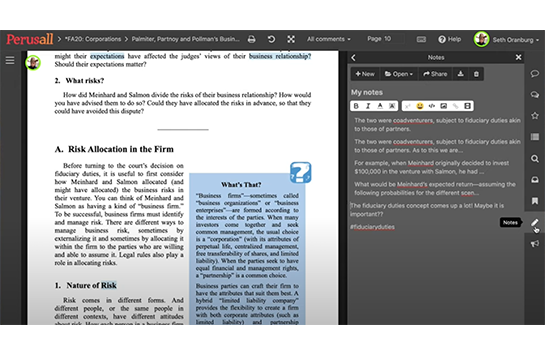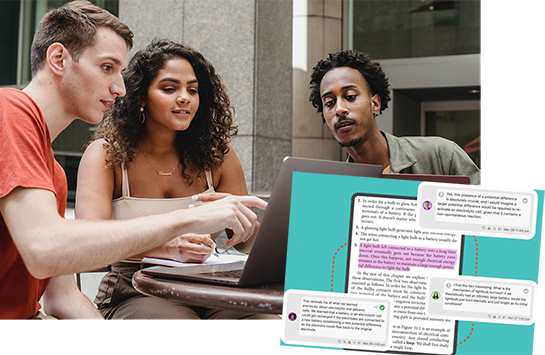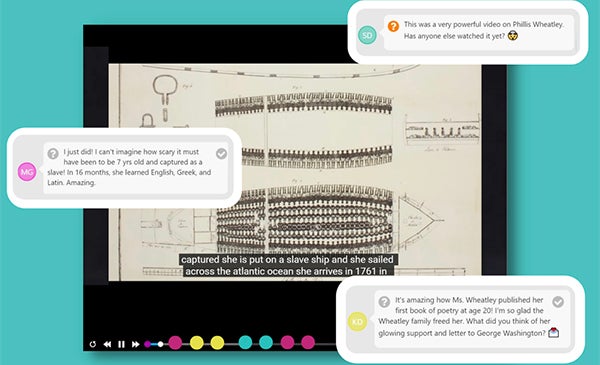Fall Pilot: Learning through Social Annotation
quote
Social annotation in the digital classroom immerses students in collaborative engagement, the ability to hone their interpretive methods, providing formative insight, and community building as it relates to course readings.
text

As the educational landscape continues to evolve, innovative tools are emerging to enhance student engagement and learning outcomes. This fall, Learning Technology Solutions (LTS) is offering a pilot program that utilizes social annotation applications. The selected applications for this pilot are Hypothesis and Perusall, both of which hold immense potential for transforming the way students interact with course materials, fostering collaborative learning, and providing instructors with valuable feedback.
Social annotation activities have proven to be highly versatile and relevant across various disciplines. Social annotation in the digital classroom immerses students in collaborative engagement, the ability to hone their interpretive methods, providing formative insight, and community building as it relates to course readings.
For students, the beauty of digital social annotation lies in its ability to provide a welcoming entry point into complex literary and theoretical works. By encouraging students to populate the margins of these digital texts with questions, insights, and observations, creating a shared space for curiosity and dialogue. It empowers students to voice their thoughts, share uncertainties, and contribute to the collective exploration of the course material. This fosters a positive intellectual and social atmosphere, promoting interactivity and a deeper understanding of the reading materials.
Instructors, too, benefit from digital social annotation activities. They gain unique opportunities for teaching and feedback, as these exercises allow them to provide formative feedback based on students’ annotations, guiding their readerly engagements more effectively. Additionally, students’ annotations become a valuable source of feedback for instructors, illuminating what aspects of the text resonate with students, where difficulties arise, and which interpretive approaches students have grasped or struggle to comprehend.
Designing incremental and iterative activities over the course of a term proves to be a highly effective approach to leveraging social annotation tools. Group work, for instance, allows students to approach texts through manageable components and collectively synthesize their insights for class-wide discussions. Assigning groups specific passages of a text or sequential parts of it fosters deep engagement and shared responsibility.
links
text 2
Hypothesis, one of the applications chosen for the pilot, enables instructors to make PDFs and websites annotatable. It empowers students to collaboratively annotate course readings, facilitating meaningful interactions and discussions through comments and replies. Instructors can also create annotation assignments, allowing students to submit their annotations for feedback and grading within the institution’s learning management system.
Perusall, the other application selected for the pilot, takes a different approach by providing professors with the means to assign necessary reading content for courses. Students can highlight sections of readings and leave comments or questions, promoting engagement with the material. Perusall’s unique feature of generating a confusion report highlights sections of texts that students find difficult to comprehend, facilitating class discussions and targeted support.
quote 2
The Social Annotation Pilot presents an exciting opportunity to revolutionize the learning experience for both instructors and students.
text 3

To ensure the success of these applications, LTS recommends several strategies, including encouraging students to ask each other questions, collaborate, and share ideas around their learning. With Hypothesis, instructors can make the syllabus annotation-enabled to create an optional space for students to connect. They can also guide students through readings with their own annotations, fostering a deeper understanding of the material.
The Social Annotation Pilot presents an exciting opportunity to revolutionize the learning experience for both instructors and students. By embracing digital social annotation, LTS aims to cultivate a culture of active, collaborative learning, enabling students to explore, question, and gain deeper insights into course materials. With the potential to transform the traditional approach to reading and learning, these innovative tools mark a significant step towards the future of education.
At the conclusion of the pilot, one or both tools will be adopted for the campus. LTS would appreciate your feedback in your use of the tool. If you are interested in participating in the Social Annotation Pilot, please indicate your interest by emailing LTS@uic.edu to set up an appointment with a staff member to discuss your classroom needs.


